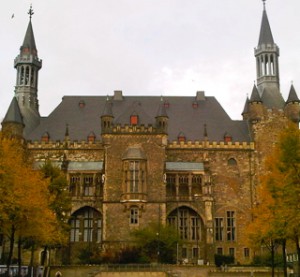The first direct rail services will soon be running between London and Germany, putting such cities as Aachen closer to the capital than Newcastle. The writer took a (not yet through) train to our nearest German city, once known as the Spa of kings, to check out some glorious treasure, very hot running water, fine dining and a famous local biscuit. Aachen is also the closest of the famous German Christmas markets to Britain.
Rapid rail
Aachen holds pole position on any alphabetical list. And it is the very first place you come to, arriving from the west, in the geographical sense too, just over the border from Belgium and Holland. (It was Aix LaChapelle, capital of treaties, when France was in charge. ) I took the Eurostar to Brussels from London, continuing, after a brief platform change, on the high speed line through the Ardennes. The trip took well under four hours, all in.
Direct services from the UK in 2013 will make it even faster. Or you could take the slower approach, to the imaginary rhythm of horses’ hooves in Robert Browning’s poem How They Brought The Good News From Ghent To Aix. There’s a dedicated 125-mile route from the Belgian city.
Mirth medal
They love giving prizes in Aachen. One particular award shows the local’s light side. The “Medal for Combating Deadly Seriousness” is granted annually to politicians, diplomats and lawyers across Europe for their sense of humour in office, and ”jovial absence of ponderous gravity.” A more serious award is the Charlemagne Prize, for politicians who advance European unity – Tony Blair is a past winner. It commemorates Charlemagne, founder of the Holy Roman Empire, who ruled from Aachen around 800 AD, and is buried in the cathedral. The award ceremony is held in the sumptuous C14th Town Hall (open to the public) on the market square, fronted with effigies of the kings crowned here. This is where they hold the closest of the famous German Christmas markets to Britain.
Treasure trove
When you‘ve seen the tremendous cathedral – German’s very first UNESCO world heritage site – head on down to the crypt for one of the finest ecclesiastical treasuries outside Italy. Prime exhibit is the Cross of Lothair (AD990). This outstanding example of the medieval goldsmith’s work is encased in gold and silver and encrusted with gems and pearls. (Another of this king’s possessions, the Lothair Crystal, featured as one of the 100 objects in the 2010 BBC History of the World series.) See, too, the velvet chasuble with embroidered pearls, a silver and gold bust of Charlemagne, and a marble tomb decorated with a relief of the Abduction of Proserpine, in which the supremo who once ruled half of Europe was buried.
Taste the tradition
As international food an drink outlets tighten their grip on our town and city centres, one 500 year old local product is holding its own in the bakers’ shop windows of Aachen. It has the support of the EU. The Aachen Printen is a kind of hard spicy biscuit, made in a mould, bearing an imprint of a person or a scene. The EU gave it “Protected Designation of Origin” status – the same thing protects, for example, Caerphilly cheese. It can only be made by bakers in and around Aachen. Just like Coca Cola, their mix is secret – the range of ingredients includes cinnamon, aniseed, clove, cardamom, coriander, allspice and ginger. Printen come plastered with almonds, chocolate and marzipan. The Printen Museum pays tribute to the tradition.
Deep heat
The best place to test Aachen’s subterranean thermal power – or to warm your hands on a cold day – is the Elisa Fountain in the city centre. Hot water gushes out from the bowels of the earth, with a diabolically sulphurous smell. (There are more fountains all around the city centre.) Either hold your nose, or feel the benefit of 18 different minerals. The hottest running water in N. Europe has drawn people here for eons. The Romans established a military bath here, and by the 1800s the royalty of Europe were flocking to the “Spa of Kings” to take the cure. Try the waters yourself in the Carolus Thermen spa, where they serve the local Printen biscuits, made in the ovens that heat the sauna. The university’s SuperC building, a short walk from the city centre with its impressive, overhanging top storey, draws up that underground energy, via a heat exchanger in a 2,544 m deep well.
Fine food
Teutonic cuisine has finally come out from the tall shadow of the French chefs’ hat. Cross out that old cliché about sauerkraut and sausages, washed down by foaming steins of beer. The German kitchen is full of finesse and invention, and Restaurant Rathskeller under the historic Town Hall on the main square is an excellent example. The genial chef, Maurice de Boer, sat down, gave me a copy of his book and described the four course special he had planned, with a glass or two of outstanding Rhine wines. The memory of roasted pineapple with black pepper sauce, with coconut ice cream and passion fruit. Service was as smooth as a top of the range BMW. It’s a memorable venue for a special celebratory meal, when you might have thought of heading to France for the occasion.
The writer traveled courtesy of Rail Europe www.raileurope.co.uk, 08448 484064

